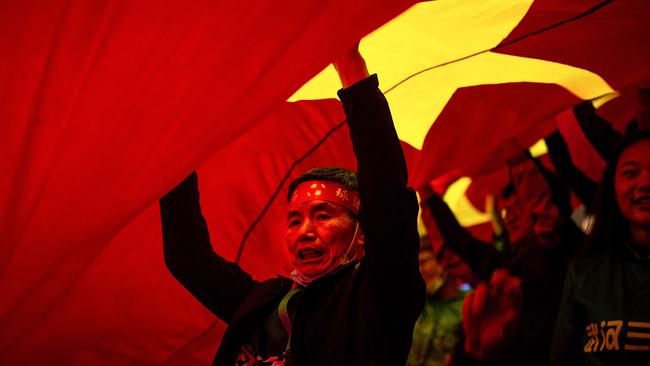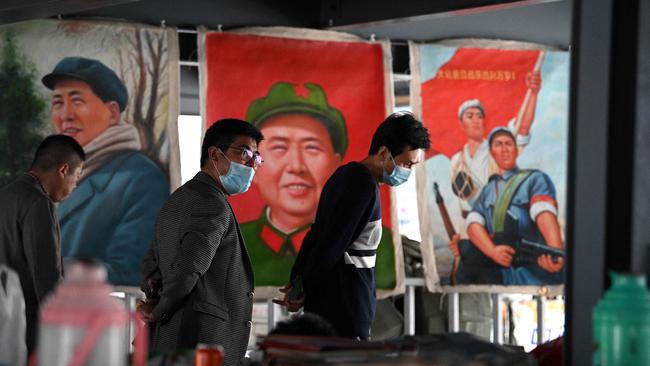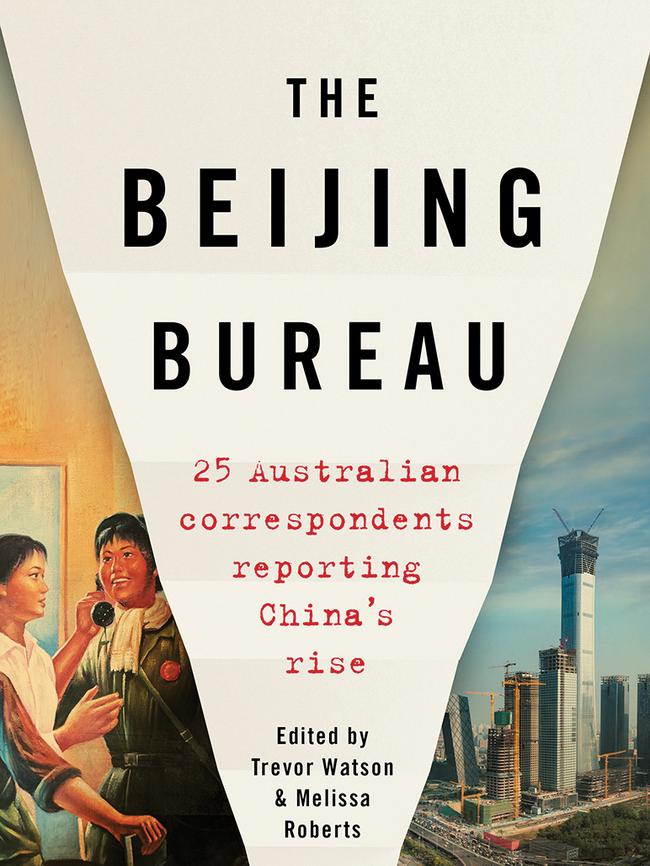How China’s national rules and spirit have been ravaged
You can leave China, but it doesn’t leave you. After three eventful postings in China, one learns not to take everything at face value.

You can leave China, but it doesn’t leave you.
My three thrilling spells as a China correspondent were both utterly consistent and stunningly different.
The consistency comprised both the pervasive rule of the Chinese Communist Party with its Soviet-derived rituals – fascinatingly arcane – and the individualism and dry humour of most regular Chinese people, whom the party falsely claims to encompass.
The differences derived partly from events, as ever, but also profoundly from leadership change, with Xi Jinping’s emergence transforming life for everyone in China – foreign correspondents, naturally, included.
My first posting, for The Australian Financial Review from 1996 to 2000, based in Hong Kong as it returned to the mainland People’s Republic of China where I travelled for one or two weeks in every month, was a time of excitement about unprecedented possibilities opening up for Chinese people and businesses.
The bars of Sanlitun in Beijing were bursting into the early hours with thrilled chatter about change and business opportunity, shouted above raunchy Filipino rock bands and local punk groups. And I fell in love with Hong Kong, its Chinese culture, its vitality – Manhattan was then its only peer – and also its self-confident civility.
My second spell, for The Australian in Beijing through 2006 to 2008, saw routinisation of China’s push towards prosperity, a relaxation of media constraints – to prove only temporary – and its re-emergence as a great power.
The two big events for journalists were the Sichuan earthquake which killed 80,000, and the Olympic Games. Both also heralded false dawns, the first of freeing up the non-government organisations that rushed heart-warmingly to form the frontline help for Sichuan, the second of a China eager and open for cooperative international relations.
Beijing reached peak internationalism during the 2008 Olympics. After that, there were fewer foreign journalists and fewer foreigners altogether.
When I returned, to the same office and apartment, for The Australian from 2016 through 2018, I witnessed even in the neighbourhood where I lived, a rapid cooling of the climate.
The tiny noodle restaurants, the florists, the rowdy bar where I joined fellow Chinese soccer fans at weekends – the matronly owner, who had briefly lived in London, was also an Arsenal fan, and shouted Maotais all around whenever the team scored – were all razed overnight as Beijing, like the Communist Party itself, was purged.

My professional attention was riveted on the relentless drumbeat of the advance of the great purist party leader Xi, whose giant profile steadily overshadowed much else in China, and whose global ambition started to land me page one stories. And the courteous and professional Foreign Ministry staff were being joined, sometimes replaced, by the notorious new wolf-warrior diplomatic elite.
When The Australian’s then editor-in-chief Chris Mitchell asked me in late 2005 to go straight to Beijing as China correspondent, I had leapt at the chance. The correspondent’s life there was different from most journalists’ elsewhere. Sometimes I would go for many weeks without encountering another foreign reporter.
For there were few – and today, even fewer – of the usual set-piece events of the trade: courts rarely open to the press; a single two-week parliamentary session every year, with access highly curated; very few press conferences, and at those that feature senior officials such as the Premier, questions are only taken from chosen correspondents who have been invited earlier to ask them, submitted in advance.
It is almost unknown for anyone senior, including at state enterprises, to be interviewed by phone. Even when I left Beijing in mid-2018, attempts to gain quotes often triggered the instruction to send questions, usually unanswered, by ancient fax technology.
One welcome exception had been the State Council Information Office, which in the early 21st century briefly embarked on the Sisyphean challenge of opening up officialdom to media. I even joined a busload of journalists that SCIO took to the HQ of the feared Central Commission for Discipline Inspection, which was to become under Xi the most powerful agency in China. Walking through the agency’s shady gardens, a reporter joked she thought she could hear cries from prisoners being held underground; our host held his grin a little too long, in ambiguous response.

I did land a couple of high-level interviews. The first, early in my first term, was with Premier Wen Jiabao. I drafted the many questions, and we drove in to Zhongnanhai, the party leaders’ HQ behind forbidding walls just west of the Forbidden City, where Wen met us in the Qing dynasty Purple Pavilion. He answered impressively all my questions for an hour, without referring once to the notes he had on his lap.
My photo shaking hands with Wen remained in my wallet until I left China, often “falling open” helpfully when officialdom appeared troubling.
Then, on the eve of the Olympics, I was one of a dozen journalists invited to “interview” President Hu Jintao in the Great Hall of the People, a very rare occasion indeed – with my photo shaking his hand taking up much of the China Daily’s front page the following day.
In that first term, my best stories came from interviewing remarkable people, with my colleague and friend Zhang Yufei’s great help, in teahouses, cafes and restaurants.
Some, like the wry writer Yu Jie, each of whose then 16 books had sold more than 100,000 copies, were intent on my noting even their most strongly critical remarks about the regime. Mao Zedong, he insisted, “was the worst tyrant in China’s history. In world history, actually. Worse than Hitler or Stalin”.
Others were more anxious, rightly so. Liu Xiaobo, the great philosopher who went on to be awarded the Nobel Peace Prize after his jailing – he died, still incarcerated, in 2017 – looked around the tearoom regularly to check for security agents, with plentiful justification, and gently responded that he was fine to anxious phone calls from his wife Liu Xia.
Often, people would be more open outside the capital: “The mountains are high and the emperor is far.” But first, we had to get there.
The rules requiring permission to travel beyond Beijing were relaxed in the lead-up to the Olympic Games and made permanent afterwards.
But people with journalist visas visiting Xinjiang have usually been tailed everywhere; I managed to join a travel group and somehow avoid the controls in 2008, but that would not be possible now.
My favourite Olympics story came from a doctor, not an athlete. Australian International Olympic Committee member Kevan Gosper had said that the lack of atmosphere at the empty Olympic Green was causing concern. Suddenly, the Green was buzzing with people, and Gosper was delighted. Until I wrote that the doctor had been instructed to report at his hospital at 6am. He joined hundreds of other staff who were bussed to the Green and told to walk around for hours – for China’s honour – until being replaced by other patriotic workers. One learns not to take everything at face value in China.
The big story ended up comprising Xi and his impact on every facet of life. When in early 2018 I told a party-member friend during a visit to Shanghai that Xi would almost certainly end term limits at the next NPC meeting, permitting him to remain in office for life, she banged her head on the wooden table at the crowded restaurant, which for a moment went silent.
Over that period, I was drafting a feature on how Xi was restructuring the party. Pressing news stories distracted me, but when I returned to the draft on my laptop I discovered written above my notes, in a strange script but in English, the words: “The glorious Communist Party of China, always with you.”
It had either been physically written in by someone gaining access to my flat or office, or hacked in remotely. It was a message.
This is an edited extract from The Beijing Bureau: 25 Australian Correspondents Reporting China’s Rise, published by Hardie Grant and out now.


To join the conversation, please log in. Don't have an account? Register
Join the conversation, you are commenting as Logout